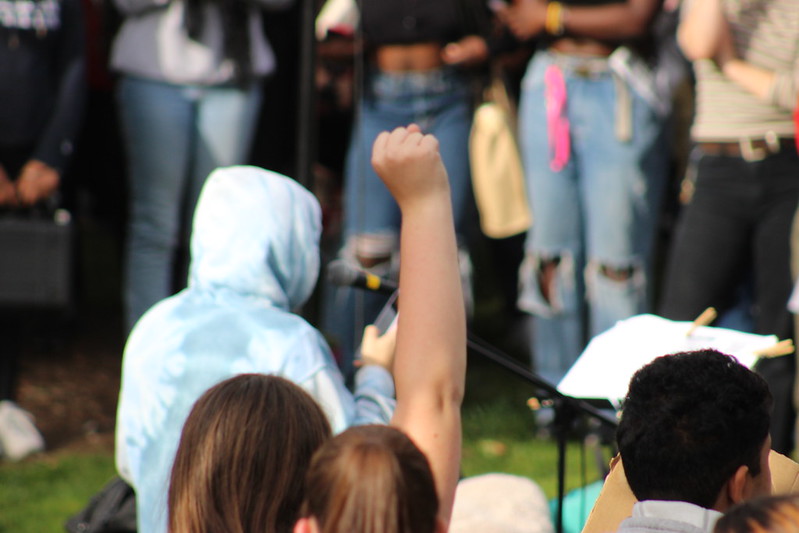Change in our culture is never easy. It’s a teeth-grinding, slow-moving and excruciatingly tedious process. That’s because American politics is used to a conservative nature. A great deal of Americans love callbacks to the good old days, and a certain president even won on the supposedly feel-good phrase “Make America Great Again.” There were over 10,000 bills brought to Congress from 2017-2019, and only 443 of them saw the finality of a President’s signature; averaging a five percent pass rate.
Basically, we love stagnation. We love staying right where we are or (more likely) going back to where we used to be. In a society so accustomed to staying exactly where it is, what we need right now more than ever is protesting: loud, passionate and disturbing.
The conversation around protesting has always been present in my education. I remember my eighth grade English teacher complaining about the disruptiveness of Black Lives Matter protests and arguing about how “all lives matter.” In high school, I would fiercely debate my peers regarding the effectiveness of protests during a time period when protesting as an action was associated with violence. And now, it’s come to my attention that there exists a conversation among the student body, nationally and locally, regarding protests as ineffective and disruptive to our education. In Cambridge, students protesting for Palestine faced wide-sweeping scrutiny from billionaire donors and renowned political influencers on the X platform. It seems that the opposition to these protests is on a shaky foundation, where they believe that protesting should be severely limited due to disagreement with the protester’s values. Unfortunately, that just doesn’t hold up.
The purpose of protests is often forgotten. Demonstrations are so important because they’re built by those deeply affected by an issue, who then bring those issues to the forefront for moderates who may be unaware of any problem at all. One study of the Black Lives Matter movement quantified that searches for specific terms such as “systematic racism” increased 100 times more than data from before a protest.
Protests are uniquely successful in getting public attention, especially among students. Between public and private four-year institutions, 25.1 percent and 29.1 percent of students have demonstrated cause for an issue (protest, boycott or rally) respectfully. Indeed, protesting among college students is on the rise. The premise of many of these protests? Money.
Nationally, public universities raked in $83.62 billion from student tuitions in the academic year of 2019-2020. Beyond this, endowments from previous students make up a median of $35.4 million in public universities. Even if a school is public, much of its funding comes from students and alumni. This means two things important for protests: first, students and past students are the arbiters of funds. Second, to make proactive change at college campuses, protesting must be centered around funding.
To that end, the issues that students are protesting historically have been liked to what the schools are funding. In 2016, University of Massachusetts students sitting in on the Whitmore Administrative building protested endowment funds to fossil fuel companies. Similarly, this year’s protests surrounding the Israel-Palestine conflict were largely due to contentions that UMass is funding genocide through its partnerships with military corporations. If what the students are protesting and disrupting academic life for can feasibly be changed within our systems, protesting is a valid outcry. It’s telling the university that we’re paying them, and that they can’t use our money in a way we disagree with without a fight.
Since the beginning of writing this piece, a peaceful protest for Israel was allegedly met with violence. An important nuance to remember to this piece is that, as students protesting at an educational university, protests are intentionally Socratic. They are ways for marginalized voices to be heard, and for hushed voices to be amplified. They are absolutely not places for students to incite violence. If protests are to be disruptive, they must do so in a way that doesn’t cause bodily harm or mental anguish to people’s identities.
In the landmark Supreme Court case upholding the right to protest, Tinker v. Des Moines, the opinion of the court was this: “In our system, undifferentiated fear or apprehension of disturbance is not enough to overcome the right to freedom of expression.” This is exactly why the case for not protesting the Israel-Palestine conflict doesn’t make sense: it’s built up by fears of disturbance due to disagreement with the message of the protest. I find it troubling that anyone can find issues with protests on campus when they cause such little disturbance to academic life, especially if the premise has nothing to do with the act of protesting but rather to do with disagreement on why a protesting is occurring. After all, the disturbances that are brought are nothing compared to the thousands of deaths that our campus may be funding in the case of the Palestine conflict.
If our establishment wants to make such a point of cultivating revolutionary students, the students have to actually be revolutionary. To that effect, the next time that our on-campus community seeks to protest something, I say make it loud. Make it disturbing. Make it impossible to avoid. It’s our money and we should make sure it’s being spent in the ways that we want.
Conor Johnston can be reached at [email protected].


















